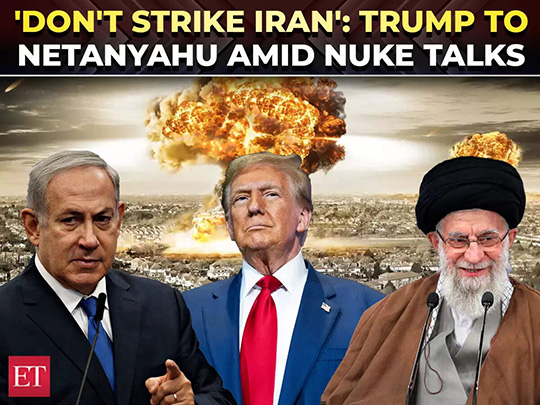
Israel had planned to strike Iranian nuclear sites as soon as next month but was waved off by President Trump in recent weeks in favor of negotiating a deal with Tehran to limit its nuclear program, according to administration officials and others briefed on the discussions, writes ‘The New York Times’.
Mr. Trump made his decision after months of internal debate over whether to pursue diplomacy or support Israel in seeking to set back Iran’s ability to build a bomb, at a time when Iran has been weakened militarily and economically.
The debate highlighted fault lines between historically hawkish American cabinet officials and other aides more skeptical that a military assault on Iran could destroy the country’s nuclear ambitions and avoid a larger war. It resulted in a rough consensus, for now, against military action, with Iran signaling a willingness to negotiate.
For now, Mr. Trump has chosen diplomacy over military action. In his first term, he tore up the Iran nuclear deal negotiated by the Obama administration. But in his second term, eager to avoid being sucked into another war in the Middle East, he has opened negotiations with Tehran, giving it a deadline of just a few months to negotiate a deal over its nuclear program.
Earlier this month, Mr. Trump informed Israel of his decision that the United States would not support an attack. He discussed it with Prime Minister Benjamin Netanyahu when Mr. Netanyahu visited Washington last week, using an Oval Office meeting to announce that the United States was beginning talks with Iran.
But inside the Trump administration, some officials were becoming skeptical of the Israeli plan.
In a meeting this month — one of several discussions about the Israeli plan — Tulsi Gabbard, the director of national intelligence, presented a new intelligence assessment that said the buildup of American weaponry could potentially spark a wider conflict with Iran that the United States did not want.
A range of officials echoed Ms. Gabbard’s concerns in the various meetings. Susie Wiles, the White House chief of staff; Defense Secretary Pete Hegseth; and Vice President JD Vance all voiced doubts about the attack.
Even Mr. Waltz, frequently one of the most hawkish voices on Iran, was skeptical that Israel’s plan could succeed without substantial American assistance.
The recent meetings came shortly after the Iranians said that they were open to indirect talks — communications through an intermediary. In March, Mr. Trump had sent a letter offering direct talks with Iran, an overture that Ayatollah Ali Khamenei, the supreme leader, had appeared to reject. But on March 28, a senior Iranian official sent a letter back signaling openness to indirect talks.
There is still significant debate within Mr. Trump’s team about what kind of agreement with Iran would be acceptable. The Trump administration has sent mixed signals about what kind of deal it wants, and what the consequences for Iran would be if it failed to agree.
In private discussions, Mr. Trump made clear to Mr. Netanyahu that he would not provide American support for an Israeli attack in May while the negotiations were playing out, according to officials briefed on the discussions.
Blocked by his American counterparts, Mr. Netanyahu has instead focused on covert sabotage operations against specific facilities and assassinations of Iranian nuclear scientists. While those efforts may have slowed the program, it is now closer than it has ever been to being able to produce six or more nuclear weapons in a matter of months or a year.
Any Israeli attack on nuclear sites would prompt a new Iranian missile barrage against Israel that would require American assistance to rebuff.
Senior Iranian officials, from the president to the head of the armed forces and foreign minister, have said that Iran would defend itself if attacked by Israel or the United States.
Brig. Gen. Mohammad Bagheri, the head of Iran’s Armed Forces, said in a speech on April 6 that Iran did not want war and wanted to resolve the standoff with the United States through diplomacy. But he warned: “Our response to any attack on the Islamic Republic’s sovereignty will be forceful and consequential.”
read more in our Telegram-channel https://t.me/The_International_Affairs

 11:00 18.04.2025 •
11:00 18.04.2025 •






















